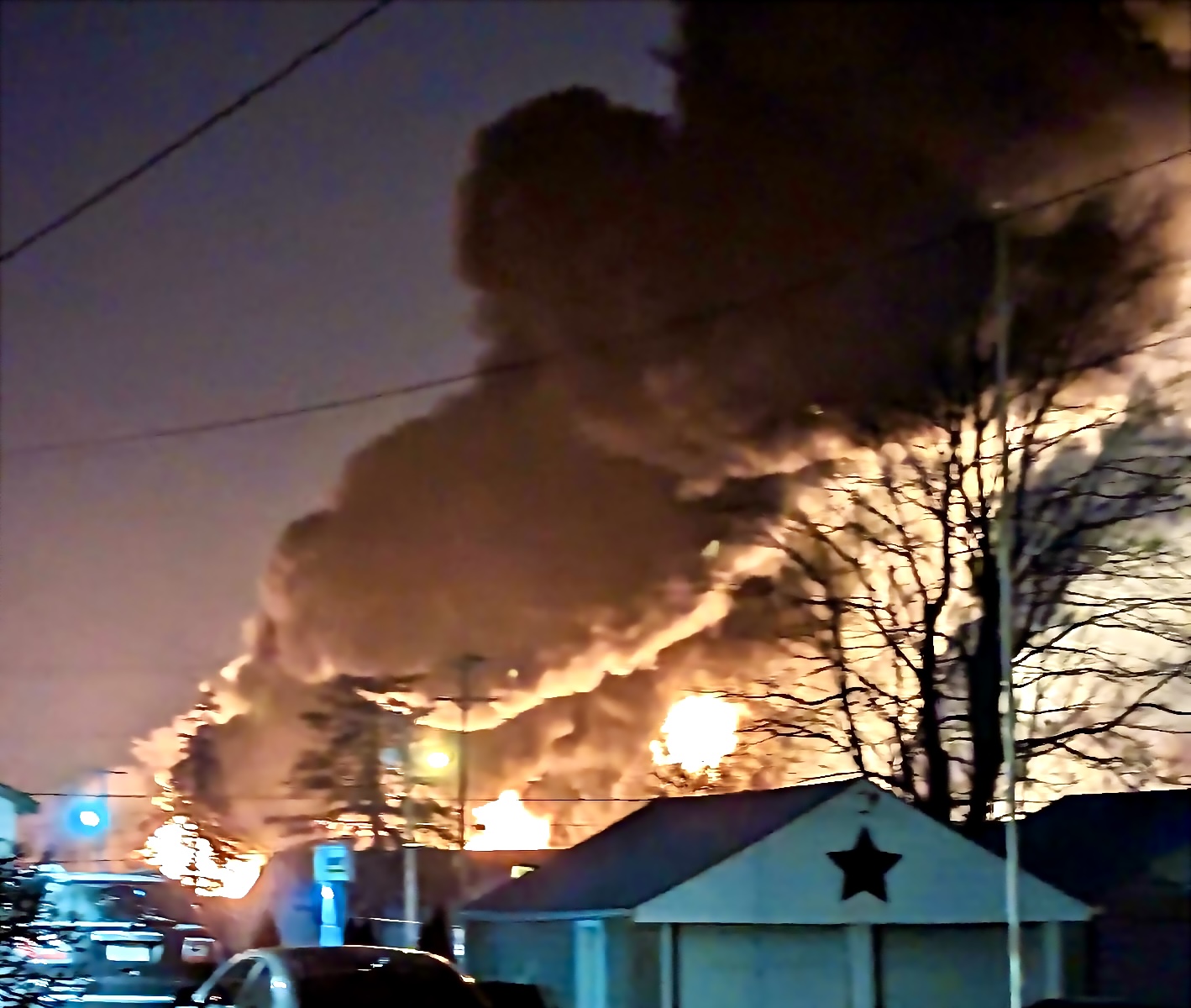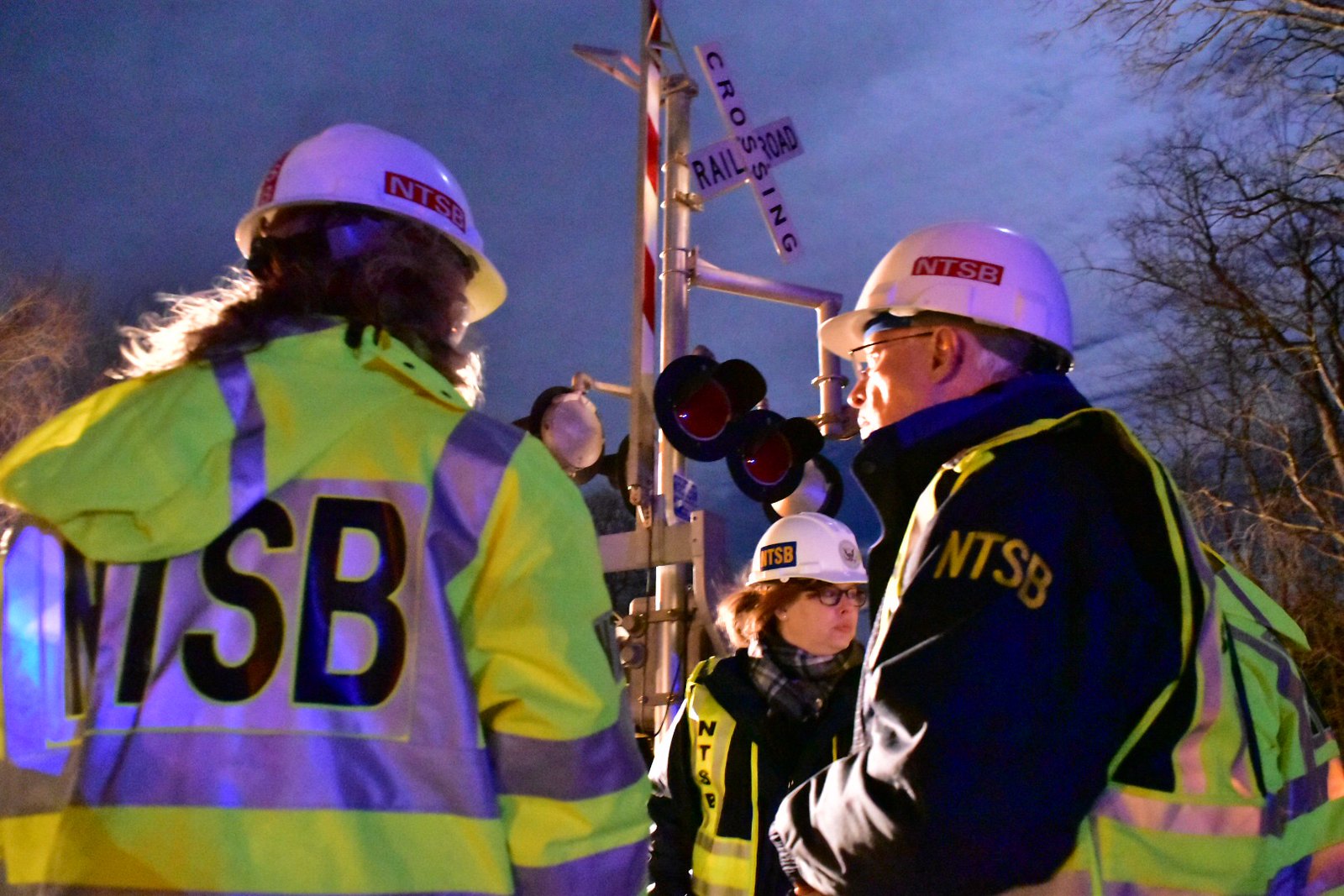Months before the East Palestine derailment, the company also directed a train to keep moving with an overheated wheel that caused it to jump the tracks in Sandusky, Ohio, Topher Sanders and Dan Schwartz report for ProPublica.

View from a resident’s front yard in East Palestine, Ohio, on the night of Feb. 3, 2023. (thunderlips36, CC BY-SA 4.0, Wikimedia Commons)
By Topher Sanders and Dan Schwartz
ProPublica

 Norfolk Southern allows a monitoring team to instruct crews to ignore alerts from train track sensors designed to flag potential mechanical problems.
Norfolk Southern allows a monitoring team to instruct crews to ignore alerts from train track sensors designed to flag potential mechanical problems.
ProPublica learned of the policy after reviewing the rules of the company, which is engulfed in controversy after one of its trains derailed this month, releasing toxic flammable gas over East Palestine, Ohio.
The policy applies specifically to the company’s Wayside Detector Help Desk, which monitors data from the track-side sensors. Workers on the desk can tell crews to disregard an alert when “information is available confirming it is safe to proceed” and to continue no faster than 30 miles per hour to the next track-side sensor, which is often miles away. The company’s rulebook did not specify what such information might be, and company officials did not respond to questions about the policy.
The National Transportation Safety Board will be looking into the company’s rules, including whether that specific policy played a role in the Feb. 3 derailment in East Palestine. Thirty-eight cars, some filled with chemicals, left the tracks and caught fire, triggering an evacuation and agonized questions from residents about the implications for their health. The NTSB believes a wheel bearing in a car overheated and failed immediately before the train derailed. It released a preliminary report on the accident Thursday morning.
NTSB issues preliminary report on Feb. 3 Norfolk Southern freight train derailment in East Palestine, Ohio: https://t.co/urnInBf9uH
Investigation: https://t.co/sPOVrteqkW pic.twitter.com/g6EJTxBHTO— NTSB Newsroom (@NTSB_Newsroom) February 23, 2023
ProPublica has learned that Norfolk Southern disregarded a similar mechanical problem on another train that months earlier jumped the tracks in Ohio.
In October, that train was en route to Cleveland when dispatchers told the crew to stop it, said Clyde Whitaker, Ohio state legislative director for the Transportation Division of the International Association of Sheet Metal, Air, Rail and Transportation Workers, or SMART. He said the help desk had learned that a wheel was heating up on an engine the train was towing. The company sent a mechanic to the train to diagnose the problem.
Whitaker said that it could not be determined what was causing the wheel to overheat, and that the safest course of action would have been to set the engine aside to be repaired. That would have added about an hour to the journey, Whitaker said.
But Whitaker said the dispatcher told the crew that a supervisor determined that the train should continue on without removing the engine.
Four miles later, the train derailed while traveling about 30 miles per hour and dumped thousands of gallons of molten paraffin wax in the city of Sandusky.

View from Jackson Pier in Sandusky, Ohio, toward Lake Erie shoreline and downtown, December 2020. (Andre Carrotflower, CC BY-SA 4.0, Wikimedia Commons)
Records from the Federal Railroad Administration, the agency responsible for regulating safety in the railroad industry, show that Norfolk Southern identified the cause of the October derailment as a hot wheel bearing. Whitaker said this bearing was on the same engine that originally drew concerns.
A spokesperson for the FRA said the agency’s investigation into the derailment is ongoing. The agency did not say whether it was examining the role of any Norfolk Southern officials in deciding to keep the damaged engine on the train. It’s still unknown what role, if any, the help desk played in the final decision.
This month, 20 miles before Norfolk Southern’s train spectacularly derailed in East Palestine, the help desk should have also gotten an alert. As the train rolled through Salem, it crossed a track-side sensor. Video footage from a nearby Salem company shows the train traveling with a fiery glow underneath its carriage.
If, like the Sandusky train, this one was dangerously heating up, a key question for investigators will be whether the help desk became aware and alerted the crew, and if it did, why the crew was not instructed to stop. The NTSB told ProPublica it is reviewing data from the Salem detector and those before it on the train’s route.

National Transportation Safety Board inspectors at the scene of a truck-train accident in Crozet, Viriginia, 2018. (NTSB, Flicker, Chris O’Neil, Public domain)
Norfolk Southern declined to say whether members of the train’s crew received an alert before the derailment and, if they did, whether the help desk told them to disregard it. The company did not address questions about its policy giving its help desk leeway to ignore such alerts. A spokesperson said that the company’s detector network is a massive safety investment, and that its trains rarely require troubleshooting.
ProPublica asked officials at the six other large freight railroad companies whether they have similar policies allowing employees to disregard such alerts. CSX and Burlington Northern Santa Fe said they don’t, and Canadian National said that no one can instruct a crew to continue traveling when they receive an alert “requiring them to stop the train.” Union Pacific, Canadian Pacific and Kansas City Southern did not respond.
While some employees and outside experts say there are times in which such policies safely benefit business operations, union officials believe they are emblematic of Precision Scheduled Railroading, the most controversial — and profitable — innovation that’s come out of the country’s seven biggest railroads, the so-called Class 1s, in the last decade. It prioritizes keeping rail cars and locomotives in constant motion.
Topher Sanders is a reporter at ProPublica covering railroad safety. Previously he covered race, inequality and the justice system. In 2019, Sanders was part of a team that was a Pulitzer Prize finalist for Public Service and won the Peabody and George Polk awards for their coverage of President Trump’s family separation policy.
Dan Schwartz is an independent investigative reporter covering railroad safety for ProPublica.
This article is fromProPublica.

Since the billion$ of dollars are used to pay dividends and finance stock purchases, it is obvious that safety is at the bottom of the list to finance. Railroad union members are on the right path when they insist that the railroad companies should be nationalized in order to make safety a priority. Our current “union supporter” potus is busy with the Ukraine war. He’s too busy to listen to common sense ideas like safety.
Why would safety be more important than profits in a nation that only sees $$$ in anything it looks at.
For NS the issue is ‘Which is more important. Safety or Shekels’.
It’s simple. Norfolk Virginia, Norfolk Southern – all ran by the same exact people.
Sounds like the case against Norfolk Southern is made in Heaven for plaintiff trial lawyers.
I guess the main issue is determining what the damages actually are.
This is the neoliberal economic model in a nutshell. The ideology of profit above all, even above lives, community and livelihoods. And since neoliberal capitalism is, in a sense, a giant ponzi scheme that constantly requires new resources and constant growth, this is the model that is being imposed on the world. This is even what is driving the animus of the West toward Russia and Putin in particular. All the mineral and other resources of Russia that were being looted by Western neoliberal economic interests after the fall of the Soviet Union until Putin put a stop to it in the interests of his own country made him the mortal enemy of Western elites. That is at the root of Western elite’s hatred for and obsession with regime change in Russia. It certainly has nothing to do with any love for freedom and democracy nor hatred for totalitarianism. The sordidness and hypocrisy of the US/EU/Western position is consistent both at home and abroad.
Yes, exactly. I would add that the people of the Western countries have yet to confront their own loss of sovereignty over their own political class. We are merely pawns in their game of power politics on behalf of the billionaire class. The entire planet has been turned into one big sacrifice zone to the gods of Mammon. It can’t continue.
Lois: Indeed. It is coming down to an actual question of survival.
Lois Gagnon:
“The entire planet has been turned into one big sacrifice zone to the gods of Mammon. It can’t continue.”
Right on the money!
“And since neoliberal capitalism is, in a sense, a giant ponzi scheme that constantly requires new resources and constant growth, this is the model that is being imposed on the world. ”
Actually, this is a different facet of capitalism, namely cost squeezing. Decreasing the cost without drop in revenue provides instant increase in profit, and sometime is VERY EASY if we compromise safety, reliability etc. And in competitive landscape, it frequently happens that those compromises go too far.
One can ask: how are monopolistic companies exposed to competition? As they are publicly traded, cost cutting is reflected in profits, profits have their expectations (Wall Street analysts), stocks increase or decrease in price dependent on failing or exceeding, while the management is incentives (often unseemly) to provide “return to stockholders”.
For example, some years ago a garment factory burned down in Bangladesh, complete with almost all workers as (what should be) safety doors were closed, and two years later, there was a similar fire in Pakistan. On the first calculus, it was probably cost effective: more fire prevention would require some spending, not locking escape doors would decrease control over breaks taken by workers and decrease productivity. One should also observe that for tens of thousands of garment factories in South Asia, the particularly tragic fires were not that frequent. However, garments are primarily produce for brands, brands need image among the consumers, so roasted workers have a measurable impact on sales, and some measures were taken.
But when customers, say, for iron ore or coal, are corporations, they do cost cutting themselves, so tragedies do not have “exponential” cost (government can intervene, but until then, so far so good),
Stopping a humungous train costs many thousands of dollars, and most of the time, a hot axle can reach its destination, saving on that cost. More generally, it is economically optimal too operate with somewhat rickety or unseemly looking equipment. In USA, there are only a bit over 1000 derailments of freight trains per year, and vast majority allow cleanup with modest cost. If a big majority of hot wheel baring did not lead to a derailment, economics dictates to ignore them when an accident is not obviously looming. Hence the rule criticized here.
And we see another mechanism: laxity is easily amplified. A supervisor is admonished for stopping a train unnecessarily, next time he/she is extra cautious — i.e. extra reckless. Train was not going under 30 mph (as the majority of freight trains do) but above 45 mph, cargo was far from innocent (although classified as such) and 20 miles before the accident, the affected cars seemed in flames, i.e. VERY HOT.
So we cannot rely on economic sensibility and ethics of company managements. Thus the need of regulation and political process.
But then we have lobbying and dual mandate of political appointees. On one hand, like a garment brand, the political party of an appointee suffers when workers are roasted, communities “fumigated” etc., on the other hand, disappointed lobbyists advise companies to direct funds to the other political party (how nice to have only two, but no huge issue if there are several).
Piotr: Good points. It seems that unless there is a deliberate effort to make human well being a priority we end up with a race to the bottom in terms of overall quality of life. Rightly or wrongly, I put a lot of blame on Milton Friedman for providing a self-serving philosophy that supports this. Devaluing life and quality of life is, I would say, a form of mental illness and it seems to have thoroughly permeated American culture and society to the point that even nuclear options for conflict resolution can be casually considered.